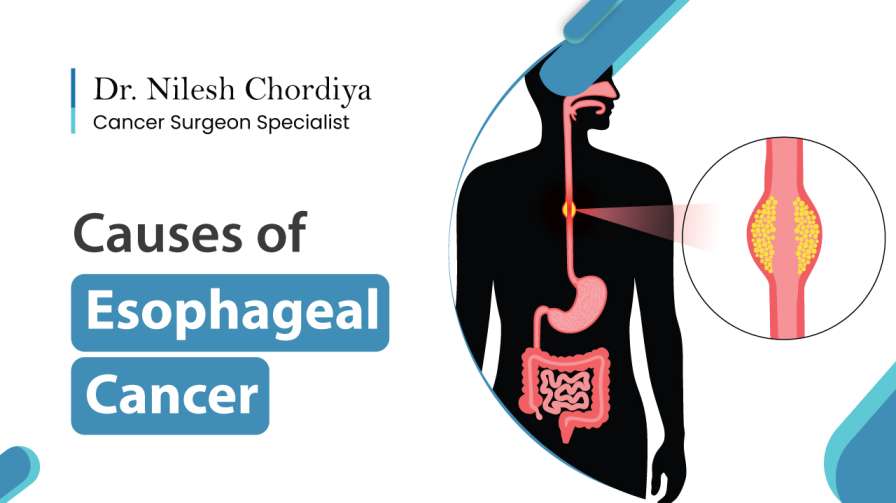What Are The Causes of Esophageal Cancer?

Overview
Cancer is a ghastly disease that can affect any part of the body. Esophageal cancer is one particularly insidious form of the illness, often going undetected until it is too late.
In this blog post, we will take a closer look at what causes esophageal cancer, and what you can do to protect yourself from it. We hope this information helps you in your fight against cancer.
What is Esophageal cancer ?
The vast majority of esophageal cancers are adenocarcinomas, which begin in cells that produce mucus and other fluids. Squamous cell carcinomas, which begin in thin, flat cells lining the esophagus, are much less common.
What causes Esophageal Cancer?
The exact cause of esophageal cancer is not known, but there are several risk factors that have been linked to the disease. These include:
Watch the video and know more about causes of esophageal cancer
- Tobacco use: Smoking tobacco is the most important risk factor for esophageal cancer. People who smoke are about six times more likely to develop the disease than people who do not smoke
- Heavy alcohol use: Drinking excessive amounts of alcohol increases the risk of developing esophageal cancer. People who drink more than two alcoholic beverages a day are at greater risk
- Gastroesophageal reflux disease (GERD): This condition occurs when stomach acid or other contents of the stomach back up into the esophagus. GERD can damage the lining of the esophagus, increasing the risk for cancer
- Obesity: Being obese or overweight can increase the risk of esophageal cancer
- Barrett’s esophagus: This condition is a complication of GERD. In Barrett’s esophagus, the lining of the esophagus is replaced by tissue that resembles the lining of the intestine. This change puts people at greater risk for developing esophageal cancer
- Certain dietary factors: Eating a diet that is high in calories and fat and low in fruits and vegetables, very hot food may increase the risk of esophageal cancer
- Certain viruses: The human papillomavirus (HPV) has been linked to an increased risk of squamous cell carcinoma of the esophagus
Need help? Talk to Our Cancer Surgeon
Get the Most Effective Cancer Treatment in India by Consulting Dr. Nilesh Chordiya, One of the Top Cancer Surgeons in Mumbai.
Who is at Risk of Esophageal Cancer?
Anyone can develop esophageal cancer, but the disease is most common in people over the age of 50. Men are about four times more likely to develop the disease than women
Other risk factors for developing esophageal cancer include:
- Tobacco use
- Heavy alcohol use
- Gastroesophageal reflux disease (GERD)
- Obesity
- Barrett’s esophagus
- Certain dietary factors
- Certain viruses
Can Acid Reflux Cause of Esophageal Cancer?
Symptoms of Esophageal Cancer
The symptoms of esophageal cancer vary depending on where the tumor is located in the esophagus. In general, early-stage tumors may not cause any symptoms at all. As the tumor grows, it can cause difficulty swallowing (dysphagia), weight loss, and chest pain.
If you experience any of these symptoms, it is important to see an Esophageal Cancer doctor so that the cause can be determined.
Also, Read- The Early Signs of Esophageal Cancer
Diagnosis of Esophageal Cancer
These tests may include an upper endoscopy, in which a small camera is used to examine the inside of the esophagus, or a biopsy, in which tissue samples are taken for further testing
Treatment Options for Esophageal Cancer
The treatment for esophageal cancer depends on many factors, including the stage of the disease and the overall health of the patient. Treatment options may include surgery, radiation therapy, and chemotherapy.
If you or someone you know has been diagnosed with esophageal cancer, it is important to seek treatment as soon as possible. Early diagnosis and treatment can improve the chances of a successful outcome.
If you prefer to watch video content, click on the video below.
Prognosis for Esophageal Cancer
The prognosis for esophageal cancer depends on many factors, including the stage of the disease at diagnosis, the overall health of the patient, and the effectiveness of treatment.
In general, the five-year survival rate for people with esophageal cancer is about 20%. However, this number may be higher or lower depending on individual circumstances.
If you have been diagnosed with esophageal cancer, it is important to work with your Esophageal Cancer Surgeon in Mumbai to develop a treatment plan that is right for you. With early diagnosis and treatment, the chances of a successful outcome are much higher.
APPOINTMENT FORM

About Author
Related Blogs
Cervical Cancer vs. Uterine Cancer: What Is the Difference?
Cervical cancer starts in the cervix from HPV, while uterine cancer begins in the uterus lining due to hormonal imbalance.
Connection Between HPV and Cervical Cancer
HPV is the main cause of cervical cancer, but vaccines and regular screening can help prevent it before it turns serious.
How Long Can You Have Cancer Without Knowing?
You can have cancer for months or years without symptoms. Learn why early detection and routine check-ups are key to staying safe and healthy.


